Unit 1 Past and Present Revision 课件
文档属性
| 名称 | Unit 1 Past and Present Revision 课件 | 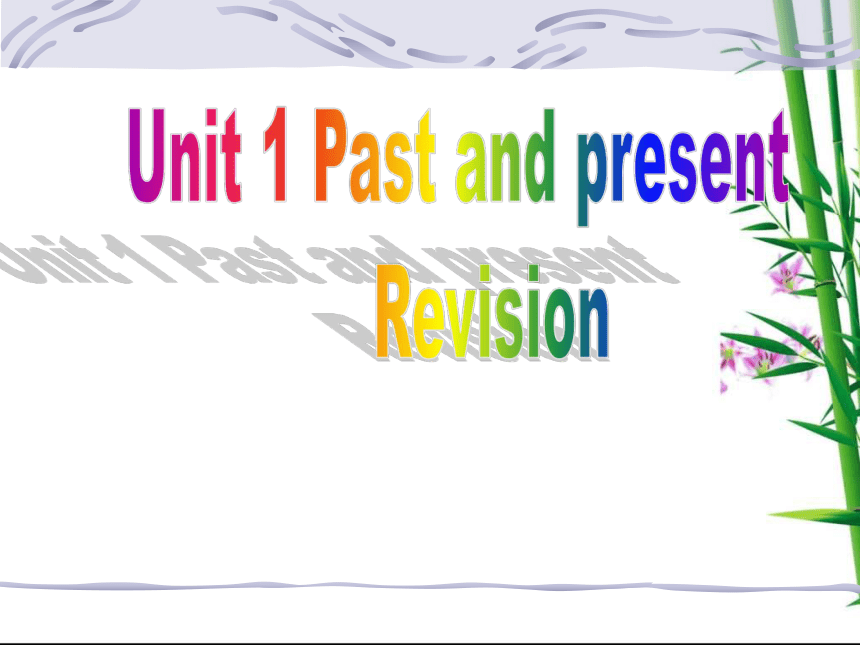 | |
| 格式 | zip | ||
| 文件大小 | 232.2KB | ||
| 资源类型 | 教案 | ||
| 版本资源 | 牛津译林版 | ||
| 科目 | 英语 | ||
| 更新时间 | 2018-06-11 10:12:46 | ||
图片预览

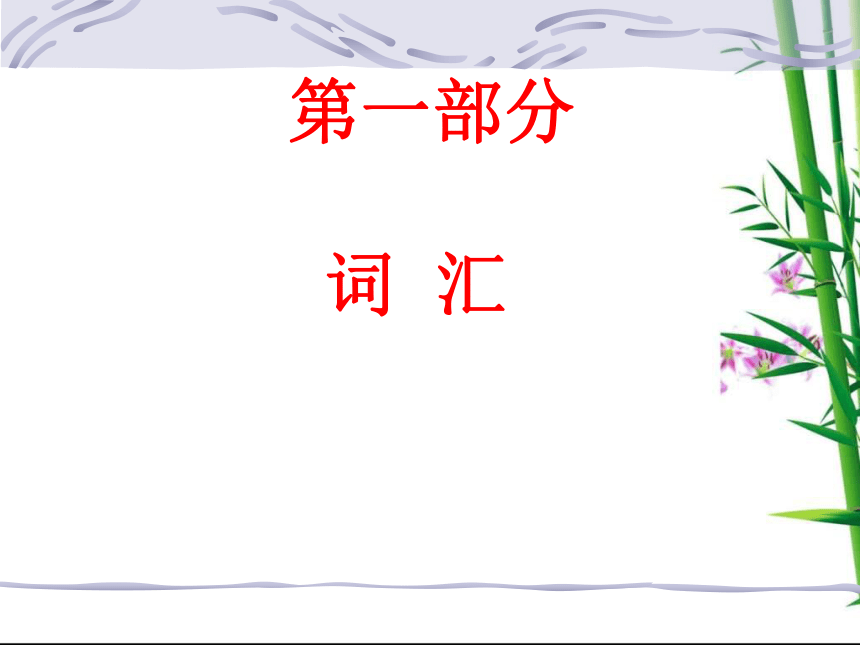
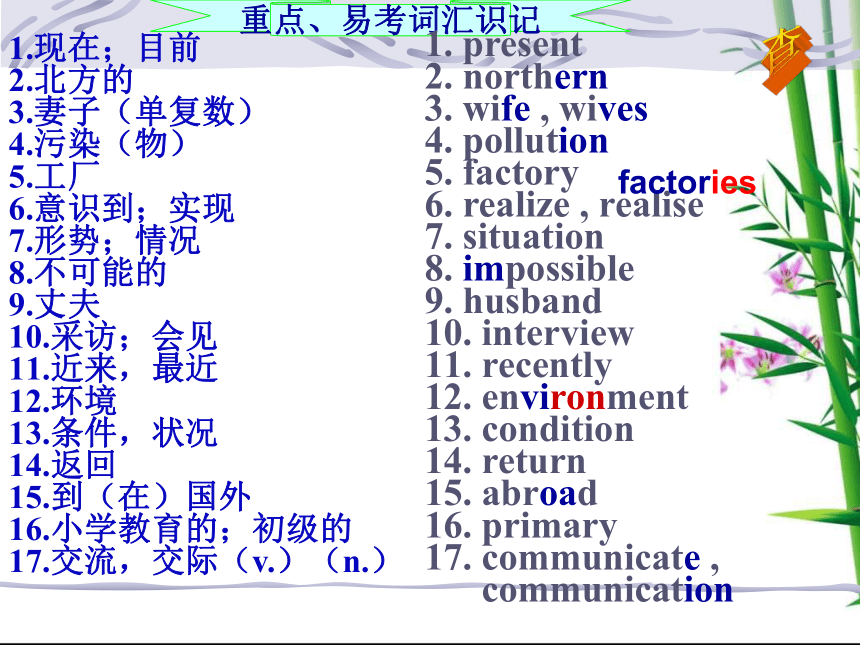
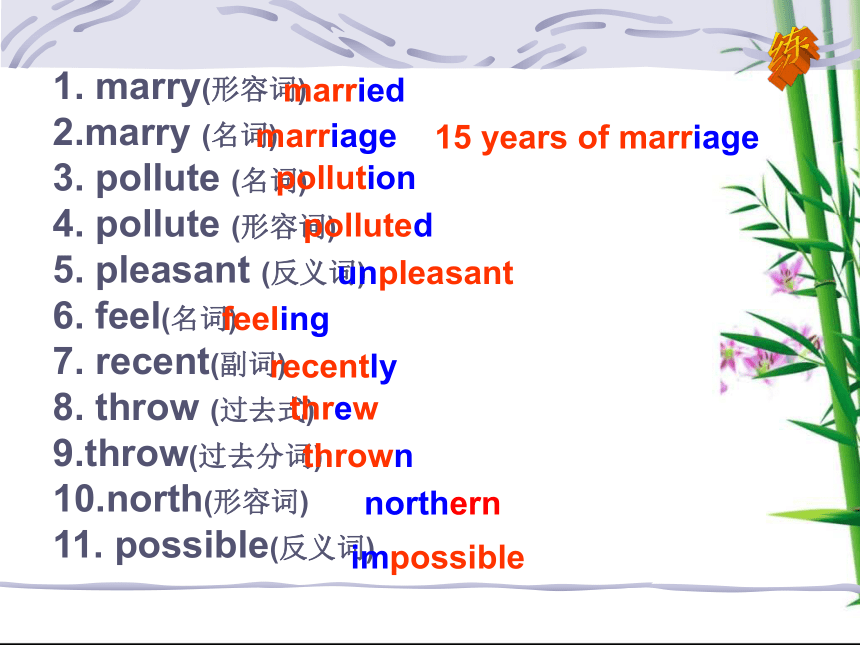
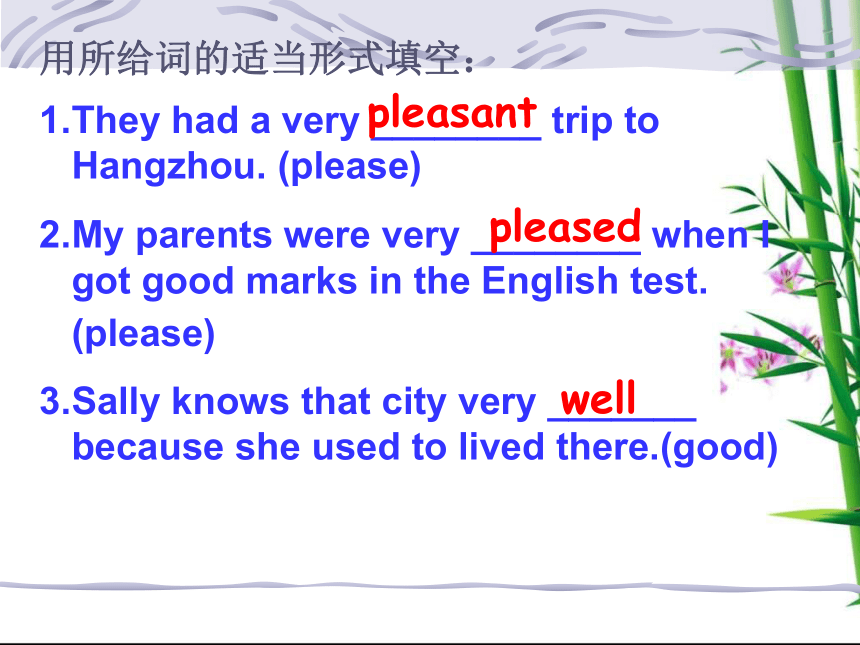
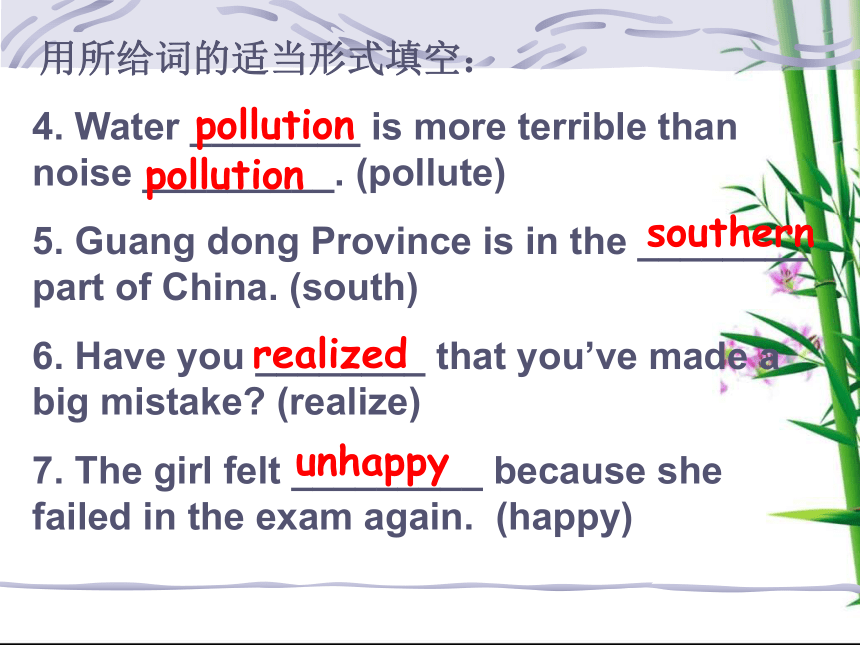
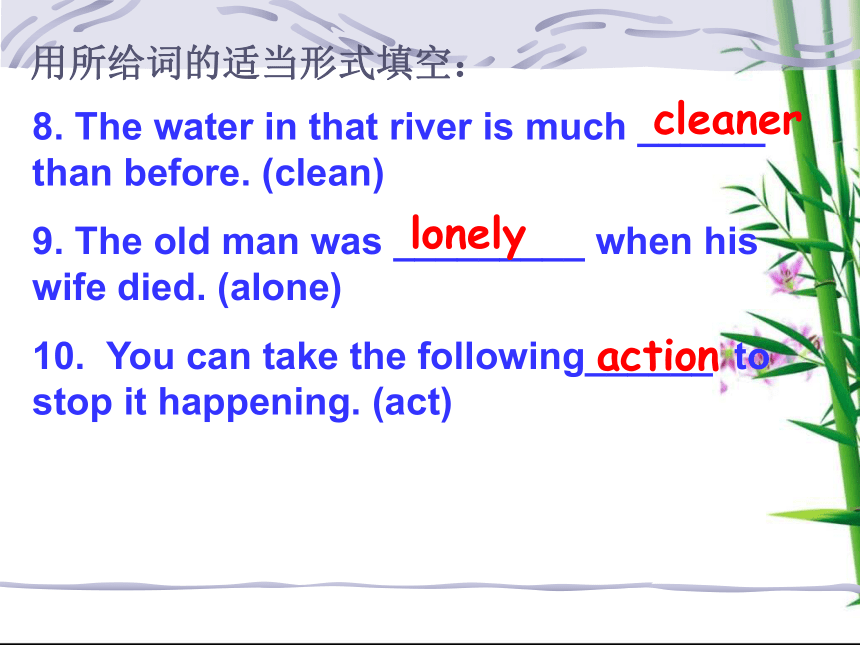
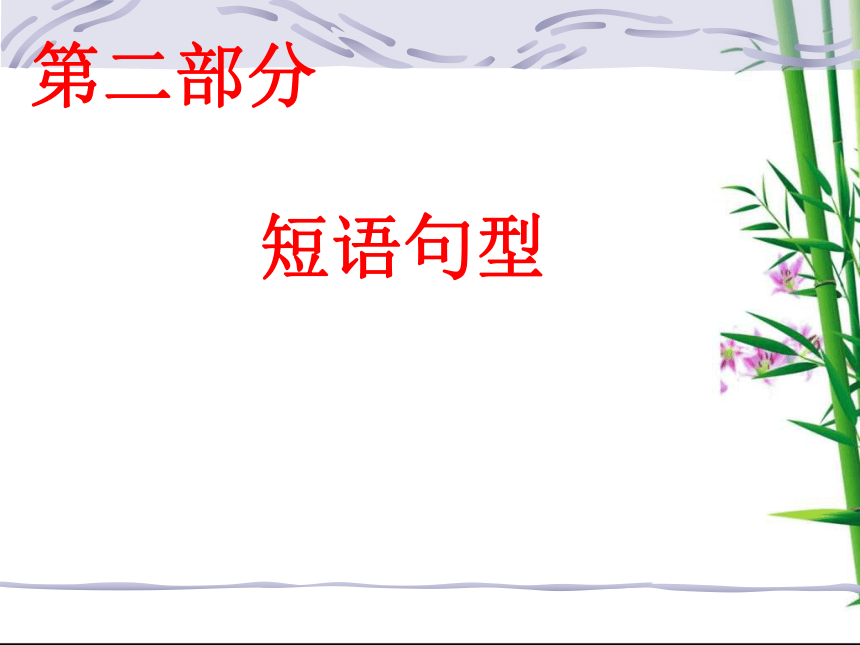
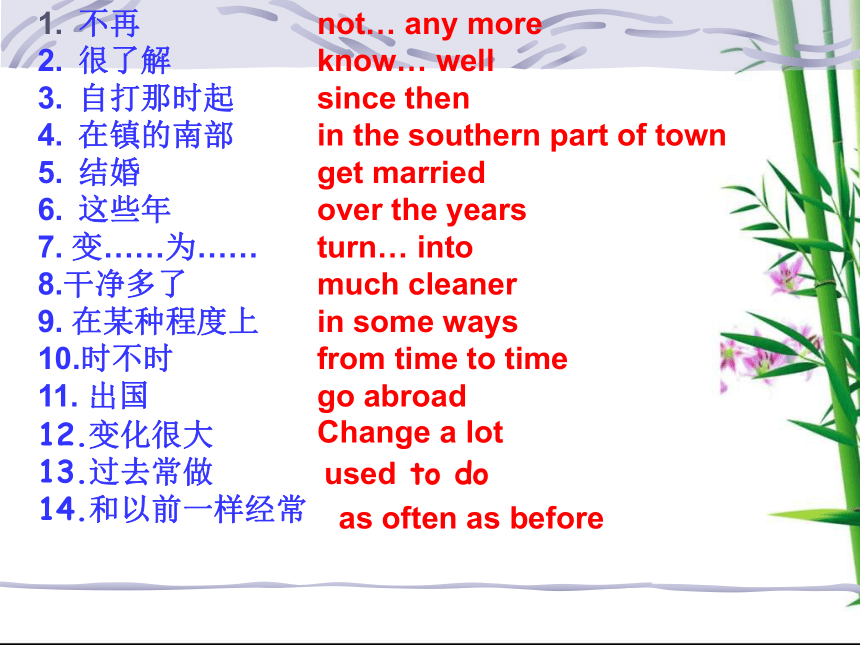
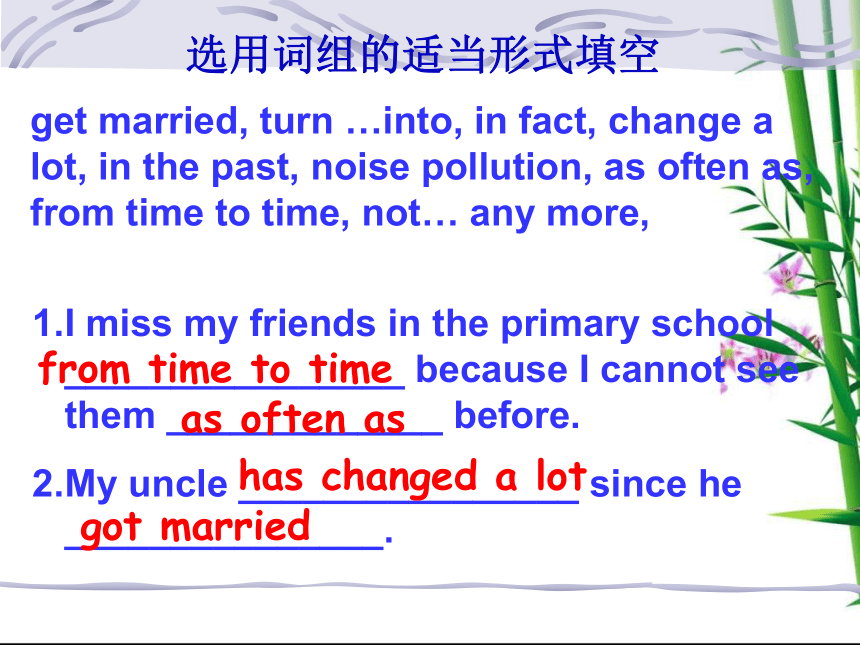
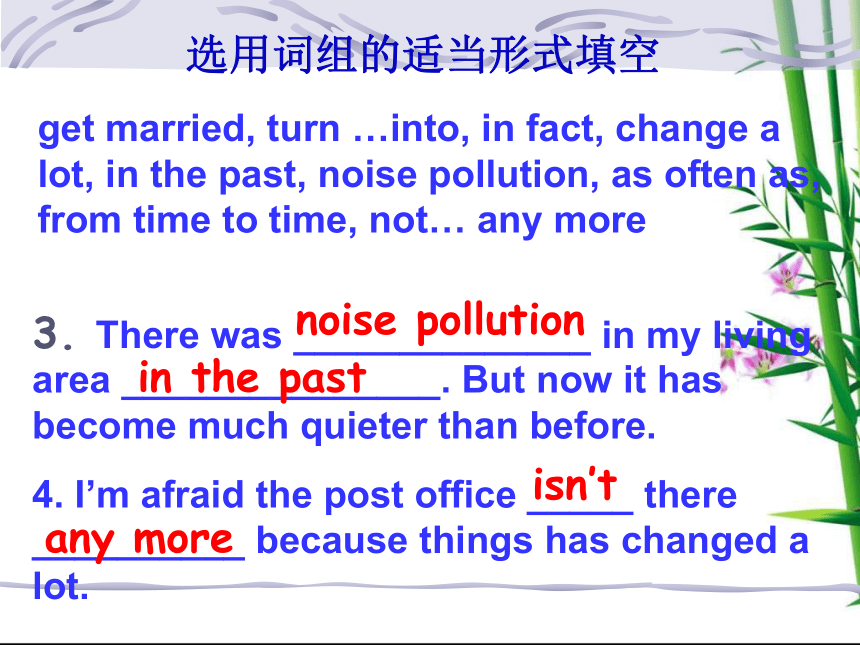

文档简介
课件49张PPT。Unit 1 Past and present
Revision第一部分词 汇重点、易考词汇识记
现在;目前
北方的
妻子(单复数)
污染(物)
工厂
意识到;实现
形势;情况
不可能的
丈夫
采访;会见
近来,最近
环境
条件,状况
返回
到(在)国外
小学教育的;初级的
交流,交际(v.)(n.)
present
northern
wife , wives
pollution
factory
realize , realise
situation
impossible
husband
interview
recently
environment
condition
return
abroad
primary
communicate ,
communication factories查1. marry(形容词)
2.marry (名词)
3. pollute (名词)
4. pollute (形容词)
5. pleasant (反义词)
6. feel(名词)
7. recent(副词)
8. throw (过去式)
9.throw(过去分词)
10.north(形容词)
11. possible(反义词)marriedmarriagepollutionpollutedunpleasantfeelingrecentlythrewthrownnorthernimpossible 15 years of marriage练用所给词的适当形式填空:They had a very ________ trip to Hangzhou. (please)
My parents were very ________ when I got good marks in the English test. (please)
Sally knows that city very _______ because she used to lived there.(good)wellpleasantpleased用所给词的适当形式填空:4. Water ________ is more terrible than noise _________. (pollute)
5. Guang dong Province is in the ________ part of China. (south)
6. Have you ________ that you’ve made a big mistake? (realize)
7. The girl felt _________ because she failed in the exam again. (happy)pollutionpollutionsouthernrealizedunhappy用所给词的适当形式填空:8. The water in that river is much ______ than before. (clean)
9. The old man was _________ when his wife died. (alone)
10. You can take the following______ to stop it happening. (act)cleanerlonelyaction第二部分短语句型not… any more
know… well
since then
in the southern part of town get married
over the years
turn… into
much cleaner
in some ways
from time to time
不再
很了解
自打那时起
在镇的南部
结婚
这些年
7. 变……为……
8.干净多了
9. 在某种程度上
10.时不时
11. 出国
12.变化很大
13.过去常做
14.和以前一样经常
go abroadChange a lotused to doas often as before选用词组的适当形式填空I miss my friends in the primary school ________________ because I cannot see them _____________ before.
My uncle ________________ since he _______________.get married, turn …into, in fact, change a lot, in the past, noise pollution, as often as, from time to time, not… any more,as often as got marriedhas changed a lotfrom time to time选用词组的适当形式填空get married, turn …into, in fact, change a lot, in the past, noise pollution, as often as, from time to time, not… any more3. There was ______________ in my living area _______________. But now it has become much quieter than before.
4. I’m afraid the post office _____ there __________ because things has changed a lot. noise pollutionin the pastisn’tany more选用词组的适当形式填空get married, turn …into, in fact, change a lot, in the past, noise pollution, as often as, from time to time, not… any more5. He looks naughty. ___________, he is a very clever boy.
6. We are trying our best to ________ our country _________ a modern and strong one.In fact turn into第三部分词汇的应用重点句型1.It has changed a lot in my hometown over the years.
Many changes have taken place in my hometown over the years.
There have been great changes in my hometown over the years .
2.You used to be so kind to me .
3. Now I feel a bit lonely from time to time .
4.I have learnt more about Beijing’s past and present .
5.The streets are wide and clean with many green trees
on both sides.
6.When I got married in 1965, my wife and I moved two
blocks away and we’ve lived in this area since then .
导change n./v.change a lotthe changes toBaoying __________________over the years. 这些年宝应来变化很大!There __________________________ Baoying over the years. Great changes _______________
in Baoying over the years. has changed a lot have been great changes in/tohave taken place 学 used to do sth过去常常做某事 e.g.
1. 我父亲过去是个老师. My father ____ ____ _____ a teacher.
2. 我曾经在这所学校学习. I ____ ____ ____ in this school.use sth to do sth 用某物做某事
be used to do /for doing sth 被用来做某事
be used as sth被用为某物
be used to doing sth习惯于做某事used to beused to studyFill in the blanks.1.There __________(过去是)a clean river and it
_____________(use) to wash clothes.
2.Can you tell me different ______(用处)of a computer?
3.The new light rail ______________(投入使用)
since 2005.
4.刀被用来切东西
Knives ___________________________________
5.以前,我不习惯早起
In the past, I ____________________________used to bewas used useshas been in useare used to cut things/for cutting thingswasn’t used to getting up early
get married 结婚
be/get married to Sb.
marry Sb. 和某人结婚
Tom ________ Mary in 1965.
Mary _____________________ Tom in 1965.
Tom and Mary ___________ in 1965. marriedgot marriedwas/got married to He feels lonely .
He feels lonely .
He spent doing his homework.
We will visit there next week.
from time to time=sometimes
some time
sometime
from time to timesometimessome timesometime一段时间某一时候有时
feel a bit lonely 感到有点儿寂寞
alone 单独 , 一个人 ( 用作表语或状 语 )
lonely 孤独的,寂寞的,偏僻的 (作表语或定语 )
eg.1. 他一个人单独居住,但从不感到寂寞.
He lives _____, but he never feel _____.
2. 他一个人住在偏僻的山村里.
He ________________________.alonelonelylives alone in a lonely villagea bit/a little + adj.(adv.)a bit of /a little + 不可数名词He knows _________________French.eg.他懂得一点法语She’s ____________afraid of her father.a bit/a little a bit of /a little a bit of /a little/a bit 她有点/有一点害怕她的父亲。have an interview with sb=interview sbinterview n/vMy parents________________________
my teacher. =
My parents_______________ my teacherThere are _______________________
some famous football players.我父母已经采访了我的老师have had an interview with have intervieweda number of interviews with 有很多采访一些著名的足球运动员return 返回= go back归还= give back 返回到学校
把它还给我return to school = go back to schoolreturn it to me = give it back to me第四部分语法Present perfect tense一.现在完成时的主要用法(一)表示之前已发生或完成的动作或状态,其结果和现在有联系或造成影响。Someone has just turned off the light.
(有人刚把灯关了。) I have already finished my homework.
(我已经完成了家庭作业。)(二)表示从过去某一时刻开始并一直延续到
现在的动作或事情,但动作或事情可能仍在
继续。
I have learnt English for more than
ten years.
我已经学了10多年的英语。
(三)表示人曾有过或到目前为止从未有过的经历. Have you ever been to the Summer
Palace? (你曾去过颐和园吗?) I have never had a car. (我从未有过汽车。)(四)现在完成时还常与以下句型连用。
This is the first time…
It’s the first time …上一页下一页This is the first time he has driven a car .
这是他第一次开车。
(五)现在完成时和最高级连用表示到现在
为止最…的。
It’s the most boring film I’ve ever seen.
这是我看过的最令人厌烦的电影。二、现在完成时的构成 1. 现在完成时的肯定句句型 主语(第一、二人称单、复数)+have 主语(第三人称复数) +have +过去分词 主语(第三人称单数) +has 2. 现在完成时的否定句句型
主语+have/has+not+过去分词+……
I have not seen the movie yet.
He hasn’t been to Beijing since then We have lived in Beijing.
He has lived in Beijing.
I have finished my homework.3.现在完成时的一般疑问句句型
Have/Has+主语+过去分词+….
Have you finished the work?
Has she arrived here?
4.现在完成时的特殊疑问句句型
特殊疑问词+have/has+主语+过去分词+…….
How many times have you been to the
Great Wall?三、现在完成时的标志词标志词(1):这种用法常与already, just, yet, ever, never, recently,before(句末)等连用1.I ________ (do) my homework already.
2.He _____________(not finished) his homework yet.
3.____you ever _____(be) to Beijing?
4.We ______ never ______ (see) such an exciting match before.
5.Mother _____ just _______(clean) the house. Please don’t come in.
6.They _________________(practice) this dialogue twice.have donehas not finishedHavebeenhaveseenhascleanedhave practiced注意:当在肯定陈述句中含有already或just 时,在转换成否定句或疑问句时,要把句中的already 或just 去掉,在句末加上yet. I haven’t seen the film yet.2 I have done my homework already.I haven’t done my homework yet.3. Mother has just cleaned the house.Mother hasn’t cleaned the house yet.1 I have seen the film already. 标志词(2):这种用法还可与 for +一段时间, since+过去的时间点, these years, so far, in the past/last …years等连用1.We __________ (learn) English for three years/ since two years ago/since 2000.
2.Mr. Green _________ (be) in China these years.
3.They ____________(write) 15 songs so far.
4.The population ____________ (grow) more slowly in the past ten years.have learnedhas beenhave writtenhas grownAttention: since的用法1. Since+ 过去某个时间(此时 since充当介词)
Eg: He has been in this school since 1999.
2. Since+一段时间+ ago (此时 since充当介词)
Eg: She has known Susan since seven years ago.
3. Since+ 从句 (此时 since充当连词)(此时主句使用完成时,从句则要使用过去时)
Eg: I have lived here since I was born.
4.当主句的谓语动词为be或seem时,则主句要采用一般现在时,从句仍使用过去时。
Eg: It’s a long time since we left school. for or since1. We have lived here ____ 1990.
2. How long have you studied here ? ___ 5 years .
3. The boy has had a bad cold _____ last night .
4. Mr. Huang has kept the books ______ a week ago .
5.I have taught in the school _____ I came here .
6We have been friends ____ a long time .sinceForsincesincesincefor切记有些动词是非延续的,在此用法中要换成其相对应的延续性动词:arrive→?????????????????? begin(start)→
die →???????????????????? come back→
leave →???????????
fall ill(sick, asleep)→
open →??????????? ?close →??????
join →
?borrow →??????? buy?→???????????
?finish/end →
get/come to → ?????????????
get married → ???????????????be in/on/atbe onbe deadbe backbe away (from)be ill(sick, asleep)be openbe closedbe in/ be a member of…keephave?be over be in/on/at???be married?1.I _____this book for two weeks, I have to return it now.
A. borrowed B. have borrowed C. kept D. have kept
2.The Greens _____many places of interest since they came to China.
A. will visit B. visited C. have visited D. visit
3.My parents ______ Shandong for ten years.
A. have been in B. have been to
C. have gone to D. have been
4.I'm sorry, I ____ your name.
A. had forgotten B. forgot C. have forgotten D. forgotten
5.Her brother _____the Party since 1978.
A. joined B. has joined C. has been in D. was in
Exercise:四、现在完成时和一般过去时的区别:现在完成时,强调这一动作产生的结果对现在的影响,与现在有关。 一般过去时,仅仅表示在过去某一时刻曾发生过这一动作,与现在无关。 他已学英语五年了。 He has studied English for five years. 他曾学过五年英语。 He studied English for five years. (说明他还继续学下去) (只说明他过去学过五年英语,但现在不学了。) 一般过去时与现在完成时有一些明显的时间状语: 遇到yesterday, Last year, in May, in+过去某一年,two days ago, just now等就用一般过去时。当有 so far, in the past/ last few days(在过去/最近的几年里),since接过去时间状语或过去时的句子等常用现在完成时。 用所给词的适当形式填空:He ____________(work) in our school for one year.
He ______(come) to our school last year.
They _______________(cook) the supper already.
They ___________ (cook) the supper half an hour ago.has workedcamehave cookedcooked第五部分 作文Changes in my hometown
1.Introduction :简要介绍自己的家乡(地点,环境)并引入话题。
2.Mainbody : 过去怎样,现在怎样(环境,生活,交通工具等)
3.Conclusion :谈谈自己的想法感受等
The changes in my hometown
Many changes have taken place in my hometown over the years.
In the past , my hometown was a poor town . There was rubbish everywhere . People lived in short houses . They used to walk or ride bikes to the town. Now , most people have moved into flats . The roads are wider . The government has also built shops and tall buildings in some large open spaces . People can go to the town by bus or taxi. But the air isn’t as fresh as before. There are fewer trees than before.
People realize that it is important to protect the environment . Now people are enjoying a comfortable life . In a word(总之) , life in my hometown is better now than before.
_____ he _____(learn) one thousand words so far?
____the town _________(change) a lot over the past few years?
He _____________(not finish) his work yet.
They __________(live) here since then.
Mr Brown __________(water) flowers when I got there.
She _________ (give) a book to me last week .
In 2012, the Wangs ______(go) abroad.Has learntHas changedhasn’t finishedhave livedwas wateringgavewent用所给词的正确时态填空。测选择填空 1、Uncle Dong is ______from time to time because he misses his old friends.
A. lonely B. alone C. happy D. unkind
2、Mr and Mrs Black ______ back _________.
A. hasn’t come, yet B. haven’t come , yet
C. haven’t , come already D. hasn’t come , already
3、We haven’t seen each other ________.
A. for a long time B. two days ago
C. for two days ago D. a long time ago.
4、It has been in use ________ 1998.
A. in B. at C. or D. since
5、It _______ seven years __________ Hong Kong return to China.
A. was, since B. is, since
C. was, after D. is , after6、--- Where are Mike and Jack?
---- They _______ the library.
A. have gone B. have gone to
C. has been to D. has gone to
7、There is a new bridge _______ the Tsing Ma Bridge.
A. call B. to call C. called D. calling.
8.I ____ you a happy holiday.
A. hope B. wish C. want D. like
9.I enjoy ________ my friends on the internet on Sundays.
A. chat B. chatting
C. chatting to D. chatting with.
10.In a dictionary which is always before tram.
A. train B. try C. tree D. true
11.The place _______ be the home of wild red cranes.
A. is used to B. used to
C. is used D. was used to
12.We hope you _______ a happy holiday in Hong Kong.
A. to have B. having C. had D. will have13.The old man was not ______ to climb up the hill.
A. healthy B. enough healthy
C. health enough D. healthy enough
14.------- _______ you _______ the book ______ to the library yet.
------ Yes. I have.
A. Have ,returned,/ B. Have, returned, back
C. Did return ,/ D. Did, return,back
15.He has _______ finished his homework. He’s now ______ a rest.
A. yet, having B. just, has
C. ever, has D. already, having.Bye-bye!
Revision第一部分词 汇重点、易考词汇识记
现在;目前
北方的
妻子(单复数)
污染(物)
工厂
意识到;实现
形势;情况
不可能的
丈夫
采访;会见
近来,最近
环境
条件,状况
返回
到(在)国外
小学教育的;初级的
交流,交际(v.)(n.)
present
northern
wife , wives
pollution
factory
realize , realise
situation
impossible
husband
interview
recently
environment
condition
return
abroad
primary
communicate ,
communication factories查1. marry(形容词)
2.marry (名词)
3. pollute (名词)
4. pollute (形容词)
5. pleasant (反义词)
6. feel(名词)
7. recent(副词)
8. throw (过去式)
9.throw(过去分词)
10.north(形容词)
11. possible(反义词)marriedmarriagepollutionpollutedunpleasantfeelingrecentlythrewthrownnorthernimpossible 15 years of marriage练用所给词的适当形式填空:They had a very ________ trip to Hangzhou. (please)
My parents were very ________ when I got good marks in the English test. (please)
Sally knows that city very _______ because she used to lived there.(good)wellpleasantpleased用所给词的适当形式填空:4. Water ________ is more terrible than noise _________. (pollute)
5. Guang dong Province is in the ________ part of China. (south)
6. Have you ________ that you’ve made a big mistake? (realize)
7. The girl felt _________ because she failed in the exam again. (happy)pollutionpollutionsouthernrealizedunhappy用所给词的适当形式填空:8. The water in that river is much ______ than before. (clean)
9. The old man was _________ when his wife died. (alone)
10. You can take the following______ to stop it happening. (act)cleanerlonelyaction第二部分短语句型not… any more
know… well
since then
in the southern part of town get married
over the years
turn… into
much cleaner
in some ways
from time to time
不再
很了解
自打那时起
在镇的南部
结婚
这些年
7. 变……为……
8.干净多了
9. 在某种程度上
10.时不时
11. 出国
12.变化很大
13.过去常做
14.和以前一样经常
go abroadChange a lotused to doas often as before选用词组的适当形式填空I miss my friends in the primary school ________________ because I cannot see them _____________ before.
My uncle ________________ since he _______________.get married, turn …into, in fact, change a lot, in the past, noise pollution, as often as, from time to time, not… any more,as often as got marriedhas changed a lotfrom time to time选用词组的适当形式填空get married, turn …into, in fact, change a lot, in the past, noise pollution, as often as, from time to time, not… any more3. There was ______________ in my living area _______________. But now it has become much quieter than before.
4. I’m afraid the post office _____ there __________ because things has changed a lot. noise pollutionin the pastisn’tany more选用词组的适当形式填空get married, turn …into, in fact, change a lot, in the past, noise pollution, as often as, from time to time, not… any more5. He looks naughty. ___________, he is a very clever boy.
6. We are trying our best to ________ our country _________ a modern and strong one.In fact turn into第三部分词汇的应用重点句型1.It has changed a lot in my hometown over the years.
Many changes have taken place in my hometown over the years.
There have been great changes in my hometown over the years .
2.You used to be so kind to me .
3. Now I feel a bit lonely from time to time .
4.I have learnt more about Beijing’s past and present .
5.The streets are wide and clean with many green trees
on both sides.
6.When I got married in 1965, my wife and I moved two
blocks away and we’ve lived in this area since then .
导change n./v.change a lotthe changes toBaoying __________________over the years. 这些年宝应来变化很大!There __________________________ Baoying over the years. Great changes _______________
in Baoying over the years. has changed a lot have been great changes in/tohave taken place 学 used to do sth过去常常做某事 e.g.
1. 我父亲过去是个老师. My father ____ ____ _____ a teacher.
2. 我曾经在这所学校学习. I ____ ____ ____ in this school.use sth to do sth 用某物做某事
be used to do /for doing sth 被用来做某事
be used as sth被用为某物
be used to doing sth习惯于做某事used to beused to studyFill in the blanks.1.There __________(过去是)a clean river and it
_____________(use) to wash clothes.
2.Can you tell me different ______(用处)of a computer?
3.The new light rail ______________(投入使用)
since 2005.
4.刀被用来切东西
Knives ___________________________________
5.以前,我不习惯早起
In the past, I ____________________________used to bewas used useshas been in useare used to cut things/for cutting thingswasn’t used to getting up early
get married 结婚
be/get married to Sb.
marry Sb. 和某人结婚
Tom ________ Mary in 1965.
Mary _____________________ Tom in 1965.
Tom and Mary ___________ in 1965. marriedgot marriedwas/got married to He feels lonely .
He feels lonely .
He spent doing his homework.
We will visit there next week.
from time to time=sometimes
some time
sometime
from time to timesometimessome timesometime一段时间某一时候有时
feel a bit lonely 感到有点儿寂寞
alone 单独 , 一个人 ( 用作表语或状 语 )
lonely 孤独的,寂寞的,偏僻的 (作表语或定语 )
eg.1. 他一个人单独居住,但从不感到寂寞.
He lives _____, but he never feel _____.
2. 他一个人住在偏僻的山村里.
He ________________________.alonelonelylives alone in a lonely villagea bit/a little + adj.(adv.)a bit of /a little + 不可数名词He knows _________________French.eg.他懂得一点法语She’s ____________afraid of her father.a bit/a little a bit of /a little a bit of /a little/a bit 她有点/有一点害怕她的父亲。have an interview with sb=interview sbinterview n/vMy parents________________________
my teacher. =
My parents_______________ my teacherThere are _______________________
some famous football players.我父母已经采访了我的老师have had an interview with have intervieweda number of interviews with 有很多采访一些著名的足球运动员return 返回= go back归还= give back 返回到学校
把它还给我return to school = go back to schoolreturn it to me = give it back to me第四部分语法Present perfect tense一.现在完成时的主要用法(一)表示之前已发生或完成的动作或状态,其结果和现在有联系或造成影响。Someone has just turned off the light.
(有人刚把灯关了。) I have already finished my homework.
(我已经完成了家庭作业。)(二)表示从过去某一时刻开始并一直延续到
现在的动作或事情,但动作或事情可能仍在
继续。
I have learnt English for more than
ten years.
我已经学了10多年的英语。
(三)表示人曾有过或到目前为止从未有过的经历. Have you ever been to the Summer
Palace? (你曾去过颐和园吗?) I have never had a car. (我从未有过汽车。)(四)现在完成时还常与以下句型连用。
This is the first time…
It’s the first time …上一页下一页This is the first time he has driven a car .
这是他第一次开车。
(五)现在完成时和最高级连用表示到现在
为止最…的。
It’s the most boring film I’ve ever seen.
这是我看过的最令人厌烦的电影。二、现在完成时的构成 1. 现在完成时的肯定句句型 主语(第一、二人称单、复数)+have 主语(第三人称复数) +have +过去分词 主语(第三人称单数) +has 2. 现在完成时的否定句句型
主语+have/has+not+过去分词+……
I have not seen the movie yet.
He hasn’t been to Beijing since then We have lived in Beijing.
He has lived in Beijing.
I have finished my homework.3.现在完成时的一般疑问句句型
Have/Has+主语+过去分词+….
Have you finished the work?
Has she arrived here?
4.现在完成时的特殊疑问句句型
特殊疑问词+have/has+主语+过去分词+…….
How many times have you been to the
Great Wall?三、现在完成时的标志词标志词(1):这种用法常与already, just, yet, ever, never, recently,before(句末)等连用1.I ________ (do) my homework already.
2.He _____________(not finished) his homework yet.
3.____you ever _____(be) to Beijing?
4.We ______ never ______ (see) such an exciting match before.
5.Mother _____ just _______(clean) the house. Please don’t come in.
6.They _________________(practice) this dialogue twice.have donehas not finishedHavebeenhaveseenhascleanedhave practiced注意:当在肯定陈述句中含有already或just 时,在转换成否定句或疑问句时,要把句中的already 或just 去掉,在句末加上yet. I haven’t seen the film yet.2 I have done my homework already.I haven’t done my homework yet.3. Mother has just cleaned the house.Mother hasn’t cleaned the house yet.1 I have seen the film already. 标志词(2):这种用法还可与 for +一段时间, since+过去的时间点, these years, so far, in the past/last …years等连用1.We __________ (learn) English for three years/ since two years ago/since 2000.
2.Mr. Green _________ (be) in China these years.
3.They ____________(write) 15 songs so far.
4.The population ____________ (grow) more slowly in the past ten years.have learnedhas beenhave writtenhas grownAttention: since的用法1. Since+ 过去某个时间(此时 since充当介词)
Eg: He has been in this school since 1999.
2. Since+一段时间+ ago (此时 since充当介词)
Eg: She has known Susan since seven years ago.
3. Since+ 从句 (此时 since充当连词)(此时主句使用完成时,从句则要使用过去时)
Eg: I have lived here since I was born.
4.当主句的谓语动词为be或seem时,则主句要采用一般现在时,从句仍使用过去时。
Eg: It’s a long time since we left school. for or since1. We have lived here ____ 1990.
2. How long have you studied here ? ___ 5 years .
3. The boy has had a bad cold _____ last night .
4. Mr. Huang has kept the books ______ a week ago .
5.I have taught in the school _____ I came here .
6We have been friends ____ a long time .sinceForsincesincesincefor切记有些动词是非延续的,在此用法中要换成其相对应的延续性动词:arrive→?????????????????? begin(start)→
die →???????????????????? come back→
leave →???????????
fall ill(sick, asleep)→
open →??????????? ?close →??????
join →
?borrow →??????? buy?→???????????
?finish/end →
get/come to → ?????????????
get married → ???????????????be in/on/atbe onbe deadbe backbe away (from)be ill(sick, asleep)be openbe closedbe in/ be a member of…keephave?be over be in/on/at???be married?1.I _____this book for two weeks, I have to return it now.
A. borrowed B. have borrowed C. kept D. have kept
2.The Greens _____many places of interest since they came to China.
A. will visit B. visited C. have visited D. visit
3.My parents ______ Shandong for ten years.
A. have been in B. have been to
C. have gone to D. have been
4.I'm sorry, I ____ your name.
A. had forgotten B. forgot C. have forgotten D. forgotten
5.Her brother _____the Party since 1978.
A. joined B. has joined C. has been in D. was in
Exercise:四、现在完成时和一般过去时的区别:现在完成时,强调这一动作产生的结果对现在的影响,与现在有关。 一般过去时,仅仅表示在过去某一时刻曾发生过这一动作,与现在无关。 他已学英语五年了。 He has studied English for five years. 他曾学过五年英语。 He studied English for five years. (说明他还继续学下去) (只说明他过去学过五年英语,但现在不学了。) 一般过去时与现在完成时有一些明显的时间状语: 遇到yesterday, Last year, in May, in+过去某一年,two days ago, just now等就用一般过去时。当有 so far, in the past/ last few days(在过去/最近的几年里),since接过去时间状语或过去时的句子等常用现在完成时。 用所给词的适当形式填空:He ____________(work) in our school for one year.
He ______(come) to our school last year.
They _______________(cook) the supper already.
They ___________ (cook) the supper half an hour ago.has workedcamehave cookedcooked第五部分 作文Changes in my hometown
1.Introduction :简要介绍自己的家乡(地点,环境)并引入话题。
2.Mainbody : 过去怎样,现在怎样(环境,生活,交通工具等)
3.Conclusion :谈谈自己的想法感受等
The changes in my hometown
Many changes have taken place in my hometown over the years.
In the past , my hometown was a poor town . There was rubbish everywhere . People lived in short houses . They used to walk or ride bikes to the town. Now , most people have moved into flats . The roads are wider . The government has also built shops and tall buildings in some large open spaces . People can go to the town by bus or taxi. But the air isn’t as fresh as before. There are fewer trees than before.
People realize that it is important to protect the environment . Now people are enjoying a comfortable life . In a word(总之) , life in my hometown is better now than before.
_____ he _____(learn) one thousand words so far?
____the town _________(change) a lot over the past few years?
He _____________(not finish) his work yet.
They __________(live) here since then.
Mr Brown __________(water) flowers when I got there.
She _________ (give) a book to me last week .
In 2012, the Wangs ______(go) abroad.Has learntHas changedhasn’t finishedhave livedwas wateringgavewent用所给词的正确时态填空。测选择填空 1、Uncle Dong is ______from time to time because he misses his old friends.
A. lonely B. alone C. happy D. unkind
2、Mr and Mrs Black ______ back _________.
A. hasn’t come, yet B. haven’t come , yet
C. haven’t , come already D. hasn’t come , already
3、We haven’t seen each other ________.
A. for a long time B. two days ago
C. for two days ago D. a long time ago.
4、It has been in use ________ 1998.
A. in B. at C. or D. since
5、It _______ seven years __________ Hong Kong return to China.
A. was, since B. is, since
C. was, after D. is , after6、--- Where are Mike and Jack?
---- They _______ the library.
A. have gone B. have gone to
C. has been to D. has gone to
7、There is a new bridge _______ the Tsing Ma Bridge.
A. call B. to call C. called D. calling.
8.I ____ you a happy holiday.
A. hope B. wish C. want D. like
9.I enjoy ________ my friends on the internet on Sundays.
A. chat B. chatting
C. chatting to D. chatting with.
10.In a dictionary which is always before tram.
A. train B. try C. tree D. true
11.The place _______ be the home of wild red cranes.
A. is used to B. used to
C. is used D. was used to
12.We hope you _______ a happy holiday in Hong Kong.
A. to have B. having C. had D. will have13.The old man was not ______ to climb up the hill.
A. healthy B. enough healthy
C. health enough D. healthy enough
14.------- _______ you _______ the book ______ to the library yet.
------ Yes. I have.
A. Have ,returned,/ B. Have, returned, back
C. Did return ,/ D. Did, return,back
15.He has _______ finished his homework. He’s now ______ a rest.
A. yet, having B. just, has
C. ever, has D. already, having.Bye-bye!
